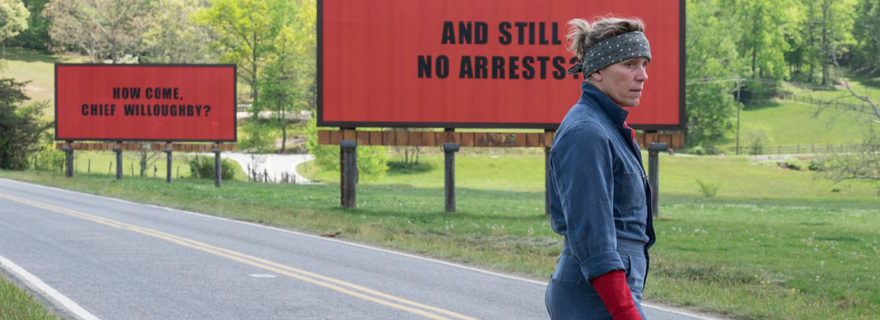'Three Billboards Outside Ebbing, Missouri'
Movie Rating:
4
‘Three Billboards Outside Ebbing, Missouri’ will likely take multiple viewings to process its achievements. What’s clear from the first round is that writer/director/playwright Martin McDonagh (‘In Bruges’, ‘Seven Psychopaths’) has created something fascinating, darkly hilarious, unexpectedly humane, and maybe even a little profound.
The film deliberately avoids easy classifications and turns down roads you’d never expect. When it’s all over, that feels like the only possible way to tell this story. It’s not about absolutes, but the muddy moral uncertainty of life.
The billboards from the title are on an empty country road. Frances McDormand plays Mildred Hayes, a strong and angry woman who covers them with purpose. Almost a year ago, her daughter was raped and murdered and the police never found a suspect, so she turns the billboards into a question for the local sheriff (Woody Harrelson). She wants action and she wants attention. She gets it. The signs unsettle the town, drawing ire from everyone including her ex-husband (John Hawkes) and the local lug head on the police force (Sam Rockwell). Mildred tears through everyone in her path (including a priest in a particularly memorable scene with one hell of a monologue). The trouble is that Sheriff Willoughby (Harrelson) isn’t a bad man and there’s no conspiracy. The cops just turned up dead ends. However, the anger put out into the world from the tragedy keeps spurring more anger and that keeps this movie twisting.
Perhaps the greatest strength of McDonagh’s wonderful screenplay (aside from the beautifully profane dialogue) is its empathetic humanism. Early on, it’s easy to see the townsfolk in the same simple and obvious moral terms as the protagonist. As time goes on and you get to know everyone, it’s hard to highlight anyone as particularly good or evil. Everyone has their reasons. Everyone has their tragedies, and the twisty-turny screenplay slowly transforms from a mystery and into a portrait of broken people struggling to survive.
The script’s many diversions range from hilarious to shocking, often in the same scene, with everything in between. McDonagh holds nothing back and has grown into quite a strong visual stylist equally capable of creating remarkable suspense and mood throughout. There isn’t a bad performance in the film; they’re all wonderfully spiky and passionate. McDormand and Rockwell are the standouts, both characters on shaky moral ground driven by passion, and both revealed to be deeper, more troubled, and more empathetic than they initially appear. This is likely McDormand’s best work since ‘Fargo’ and possibly the finest work of Rockwell’s career.
Along the messy, rambling, hilarious, moving, and violent road of ‘Three Billboards’, the film grows into something more than a mere small town crime comedy. It even feels like a worldview, a place where horrible things happen with no reason or repercussion and where everyone is their own private mess struggling to do something right. There’s something funny and painfully yet thoughtfully true about that, and McDonagh explores his theme in entertaining ways. This feels like a movie that will only grow over repeated viewings. Despite the difficult subject matter, it should be easy to dive back in. These characters are too wonderfully written and performed. You’ll want to visit them again like old friends.






Timcharger
Why write another review just 7 weeks later?
https://www.highdefdigest.com/blog/three-billboards-outside-ebbing-missouri-movie-review/
—–
“‘Three Billboards Outside Ebbing, Missouri’ will likely take multiple viewings to process its achievements. What’s clear from the first round is that writer/director/playwright Martin McDonagh (‘In Bruges’, ‘Seven Psychopaths’) has created something fascinating, darkly hilarious, unexpectedly humane, and maybe even a little profound.”
I disagree. Only somewhat, but it’s a disagreement. If the film did not receive all the fanfare and accolades, no worries. But because the film got so much praise, it deserves to be knocked down a notch.
I have no issue with the Sam Rockwell character and how there’s criticism about how racism is strangely put in the background and left as an elephant in the room. And the criticism that Rockwell was undeservedly redeemed. Of course, I don’t think he earns it, but I actually don’t think Rockwell was really redeemed at all. So that’s not my gripe.
“‘Three Billboards… will likely take multiple viewings to process its achievements.”
Nope. One viewing is enough.
“What’s clear from the first round is that… McDonagh…has created something fascinating…”
Yup. Fascinating.
“…darkly hilarious…”
Yes. Chuckles and wicked smiles.
“…unexpectedly humane…”
Yes. Gut-wrenching emotional scenes.
“…and maybe even a little profound.”
No, no, no. It’s not profound. It’s just absurdity. It’s just a car crash, leading to another car crash on a freeway pile up. There’s nothing profound. The ending isn’t profound. It’s a beautiful looking car crash, but trying to see the profundity of the random absurdity of spectacular car accidents is a lost cause. Enjoy the spectacle. But this film is the equivalent to the other end of the spectrum of a fun popcorn summer blockbuster starring the Rock. Instead of CG, 3 Billboards uses unrealistic long soliloquies. Instead of explosions, 3 Billboards uses quirky characters with gotcha moments and surprise bouts of humor. Instead of revealing cleavage, 3 Billboards reveals convenient plot turns. At the end of the film, 3 Billboards is as satisfying as that fun popcorn flick, but you really just ate popcorn. There’s nothing profound.
Has McDonagh looked at a map of the U.S. and seen where Missouri and Idaho are? Yes Ebbing is fictional, but either you need to explain in the plot why the tiny town of Ebbing would have an Idaho visitor or easily change the licence plate to Arkansas or Kentucky? Because of this minor nitpick, it supports the criticism that 3 Billboards is just what a British playwright imagines rural America to be.